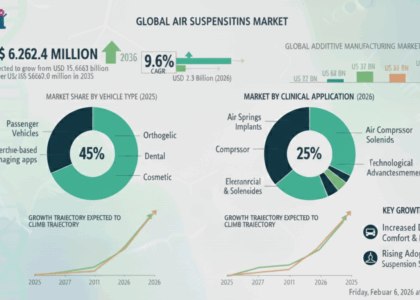
The global electric vehicle motor market is set to strengthen its market hold globally at a promising CAGR of 21% from 2024 to 2034. The net revenue generated from the global EV motor industry is forecasted to hold a revenue of USD 571,809.04 million by 2034, growing from USD 84,995.77 million in 2024. The electric vehicle motor market represents 14.3% of the total electric vehicles market share, including battery electric vehicles (BEV), hybrid electric vehicles (HEV), and plug-in hybrid electric vehicles (PHEV). With the global push toward reducing carbon emissions, the rapid advancement of EV technologies, and major government initiatives supporting electrification, the EV motor market is entering a high-growth phase, characterized by both innovation and investment across developed and emerging economies.
Get Ahead with Our Report: Request Your Sample Now!
https://www.futuremarketinsights.com/report-sample#5245502d47422d37363631
Key Takeaways:
The electric vehicle motor market is witnessing a massive surge, spurred by the explosive growth of the overall EV market and the increasing consumer preference for eco-friendly and efficient transportation options. The demand for high-performance, lightweight, and energy-efficient motors is driving significant R&D activities among manufacturers. Technological improvements such as the integration of rare-earth permanent magnets, advancements in thermal management systems, and the use of more compact, power-dense motors are reshaping industry standards. Additionally, the rise of high-voltage architectures in EVs is increasing the requirement for motors that can deliver greater efficiency at higher operating speeds. The significant growth in commercial electric fleets, from delivery vans to electric buses, further expands the opportunities for motor manufacturers to diversify and specialize.
Emerging Trends in the Global Market:
The global electric vehicle motor market is evolving rapidly, driven by several transformative trends. One major trend is the increasing adoption of axial flux motors, known for their compact size, higher torque density, and improved efficiency compared to traditional radial motors. These motors are gaining preference, particularly in performance-focused EV segments and luxury vehicles. Another important trend is the industry’s move toward integrated drive units, where the motor, inverter, and transmission are combined into a single compact system, leading to greater efficiency and cost savings. Additionally, sustainability is playing a critical role, with manufacturers exploring alternatives to rare-earth materials, aiming to reduce dependency on costly and geopolitically sensitive resources. Moreover, artificial intelligence and predictive maintenance technologies are being embedded within motor management systems, enabling real-time performance optimization and longer service lifespans.
Significant Developments in the Global Sector: Trends and Opportunities in the Market:
The electric vehicle motor sector is experiencing profound changes as companies race to meet the demands of an electrified future. Significant developments include a focus on developing motors specifically optimized for solid-state battery-powered EVs, which promise faster charging and higher energy densities. The rising popularity of two-wheeler and three-wheeler electric vehicles in emerging markets like India and Southeast Asia is creating a strong demand for affordable, durable motors suitable for urban commuting. Additionally, opportunities are emerging in the aftermarket and service segments, as the growing number of EVs in operation creates a demand for motor replacement, servicing, and upgrades. New business models, such as motor leasing and motor-as-a-service concepts, are being explored to reduce the upfront costs associated with electric propulsion systems. Furthermore, collaborations between automotive OEMs and motor technology specialists are intensifying, fostering faster innovation cycles and the commercialization of cutting-edge motor designs.
Recent Developments in the Market:
Recent activities in the electric vehicle motor market highlight the sector’s dynamism and aggressive push toward innovation. Several leading automotive manufacturers have announced the development of next-generation in-house electric drive systems that integrate the motor with other key EV components to reduce weight, cost, and complexity. Breakthroughs in silicon carbide (SiC) power electronics are also influencing motor performance by enabling higher efficiency and greater driving range. Companies are actively investing in the vertical integration of motor manufacturing to control quality, secure supply chains, and achieve greater economies of scale. Furthermore, the expansion of EV production facilities, particularly in North America and Europe, is accompanied by a parallel rise in local motor manufacturing capabilities to meet regional content requirements and reduce dependency on imports.
Thorough Market Evaluation: Full Report
https://www.futuremarketinsights.com/reports/electric-vehicle-drive-motor-market
Competition Outlook:
The electric vehicle motor market is highly competitive, with a mix of established automotive players and innovative motor technology companies leading the field. Major players shaping the competitive landscape include Tesla, Inc., Robert Bosch GmbH, Nidec Corporation, Mitsubishi Electric Corporation, Denso Corporation, Continental AG, Siemens AG, Toshiba Corporation, ZF Friedrichshafen AG, and BYD Company Limited. These companies are focusing on developing high-efficiency motors, strengthening their global manufacturing networks, and forging partnerships with automakers to secure long-term supply agreements. Investment in advanced motor testing facilities, material innovation, and software-driven motor management solutions are key strategies adopted by leading players to gain a competitive advantage.
Key Segmentations:
The market can be segmented by motor type into AC motors, DC motors, and permanent magnet synchronous motors (PMSM). Among these, permanent magnet synchronous motors are expected to maintain dominance during the forecast period due to their superior efficiency, power density, and performance characteristics, making them ideal for modern EV applications. By vehicle type, the market is segmented into battery electric vehicles (BEV), hybrid electric vehicles (HEV), and plug-in hybrid electric vehicles (PHEV). Battery electric vehicles account for the largest share, driven by the growing adoption of zero-emission transportation and expanding charging infrastructure. By application, segmentation includes passenger cars, commercial vehicles, and two-wheelers. The passenger car segment leads the market, but commercial electric vehicles are expected to witness the highest growth rates owing to the electrification of logistics and public transport fleets. Regionally, the market is segmented into North America, Europe, Asia-Pacific, Latin America, and the Middle East & Africa. Asia-Pacific currently holds the largest share, fueled by the strong presence of EV manufacturers in China, Japan, and South Korea, along with robust government incentives promoting EV adoption.
About Future Market Insights (FMI)
Future Market Insights, Inc. (ESOMAR certified, recipient of the Stevie Award, and a member of the Greater New York Chamber of Commerce) offers profound insights into the driving factors that are boosting demand in the market. FMI stands as the leading global provider of market intelligence, advisory services, consulting, and events for the Packaging, Food and Beverage, Consumer Technology, Healthcare, Industrial, and Chemicals markets. With a vast team of 400 analysts worldwide, FMI provides global, regional, and local expertise on diverse domains and industry trends across more than 110 countries.
Contact Us:
Future Market Insights Inc.
Christiana Corporate, 200 Continental Drive,
Suite 401, Newark, Delaware – 19713, USA
T: +1-845-579-5705
For Sales Enquiries: sales@futuremarketinsights.com
Website: https://www.futuremarketinsights.com
LinkedIn| Twitter| Blogs | YouTube




